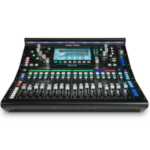Forums › Forums › Qu Forums › Qu general discussions › Double tracking vocals
Tagged: Backline, Too loud, you're the boss
- This topic has 16 replies, 12 voices, and was last updated 8 years ago by
 GCumbee.
GCumbee.
-
AuthorPosts
-
2016/11/27 at 2:17 pm #59524
 RoyParticipant
RoyParticipantHi all
I had a troublesome pub gig last night where in struggled all night with getting the vocals above the guitars. I have several spare channels available on the QU16 (paired with a dbx Driverack and a pair of Turbosound IP2000 line arrays). I was wondering if there was a method to feed one of the spare channels with the vocal on channel 9 for the lead singer and effectively double the strength of the main vocal. Is this something anyone has tried? Is it even possible or a good idea?
All help welcome. Thanks in advance.
Roy
2016/11/27 at 2:56 pm #59525 Dick ReesParticipant
Dick ReesParticipantNo. If you want to increase the voice level, just turn it up…pre-amp, fader or comp gain… You only have so much GBF, so you can’t just “double” something.
Your problem is typical: too much on-stage amp volume and a wimpy PA. There’s no way any of the “stick” systems can provide a workable voice amplification system in your situation. They’re made for singer songwriter coffee house use. Anything more than that and you’re SOL.
Get a pair of decent powered speakers and stands. Those so called “line arrays” are a bad joke, sorry to say.
2016/11/27 at 3:00 pm #59526 AndreasModerator
AndreasModeratorIf it was a volume problem, why not just rise gain on the vocals channel? Using a second channel (with identical settings) is same as adding +6dB gain.
2016/11/27 at 5:03 pm #59527timhum
ParticipantAs above, just turn up the vocal mic and have enough grunt in your PA to overcome the backline amps. I do the PA for a big band in the function room of a pub. The band is massively too loud for the vocalist who told me all she could hear from her wedge was the band. Only her mic was feeding the wedge so that was the scale of the problem. I work a fraction below the point where the vocal mic rings prior to howling and it is frankly not enough when the band are blowing hard.
Which brings me to another solution, maybe the room you are in is too small for that volume from the guitars. If you can, ask the players to hold back a bit on their volume in line with what you can do for the singer. It is more normal to adjust the mix to fit in with what the drummer sounds like. In several bars in Brighton, groups are told to bring a set of electric drums so the overall volume is right for the venue.2016/11/27 at 9:30 pm #59531Ruud
ParticipantI have a QU24. Last few gigs I used this trick for vocals:
On channel/strip 21 I have the vocal mic input. In the set-up I change the input of strip 22 to input 21.
Channelstrip 22 I delay for approx 200msec. I pan channel 21 hard left and channel 22 hard right.
Of course you can experiment with delay-time, EQ, but also of several effects on each of these channels.
This simulates doubling the vocal as used during post-production for a CD. And result in more voluminous (correct spelling?) vocals.
Maybe this is what you are after?2016/11/28 at 9:53 am #59538 DavidCoParticipant
DavidCoParticipantHave you tried the ADT effect? 🙂
DC
2016/11/28 at 5:48 pm #59545 DoctorGParticipant
DoctorGParticipantYou might try using some compression with added gain on the vocals plus some limiting on the band so that the vocal level is more consistent.
The real problem has already been suggested – too much stage volume.
2016/11/28 at 6:58 pm #59547Giga
Participant+ 1 To all the above + 2 more: make sure you explain the singer the correct mic techniqe and try to make some roomrecording to share with the band. With a bit of luck that’ll let the quarter drop.
Giga
2016/11/28 at 7:20 pm #59548Anonymous
InactiveHave you tried the ADT effect
plus all of above.
Have you tried different mics?
You didnt say what Mic you are using?2016/11/28 at 8:06 pm #59549 GCumbeeParticipant
GCumbeeParticipantHere’s a unique concept that I guarantee works every time. Tell the band to just turn the crap down!!! It’s a team effort. No one is a star unto them self. I swear that works. I won’t even charge a consulting fee for that.
2016/11/29 at 8:32 am #59558Hoody
ParticipantDon’t turn the Vox up
Turn the rest of the band down!
Perennial problem, the band thinks what they hear on stage is what the audience hears so they ignore the sound tech.
20 years, digital mixers, in ear monitoring and still bands do this!2016/11/29 at 9:07 am #59559Anonymous
InactiveIn general turning everything else down reduces the mud as well, making everythin(even that which you just turned down) much more audible.
2016/11/29 at 4:00 pm #59566 RoyParticipant
RoyParticipantHi all
Many thanks for the help guys – it is much appreciated. You’ve confirmed pretty much what I thought.
DavidCo, I use SM58 mics but not the new SM58 PEQ factory setting which I find a little harsh and ringy. The ADT effect I do use on one of the spare mix sends as my FX 1 and FX2 sends are used for verb and delay and we only get 2 dedicated sends on the QU16. I’ve found it doesnt really add much.
In terms of compression I use a threshold of -18dB, a ratio of 3.2:1 with a make-up gain of 6dB (normal attack and release for vox). Any higher on that ratio and gain and I’d be worried about feedback.
I think I need to just grow a pair and tell them to quieten down a little!!
BTW, the IP2000 speakers have proven to be plenty loud enough so far and I’m really pleased with them. Just in this particular pub, with loads of reflective surfaces and low ceilings, I was paranoid about not pushing them too far and deafening everyone with feedback.
Please keep the suggestions coming if you have any.
Again, your help is appreociated.
Cheers
Roy
2016/11/29 at 5:36 pm #59568Giga
ParticipantIt largely depends on how much gain you begin with on that vox channel of course but -18 to let the compressor kick in seems quite quick. How much db are compressing with that setting ?
It’s my experience that putting too much compression on pretty much anything seriously compromises the power and the punch of said signal
Giga
2016/11/29 at 6:08 pm #59569 Dick ReesParticipant
Dick ReesParticipantYup, too much compression and too soon.
Simply try raising the threshold during use and see if the vocal doesn’t surface.
And what are your attack/release settings?
-
AuthorPosts
- You must be logged in to reply to this topic.